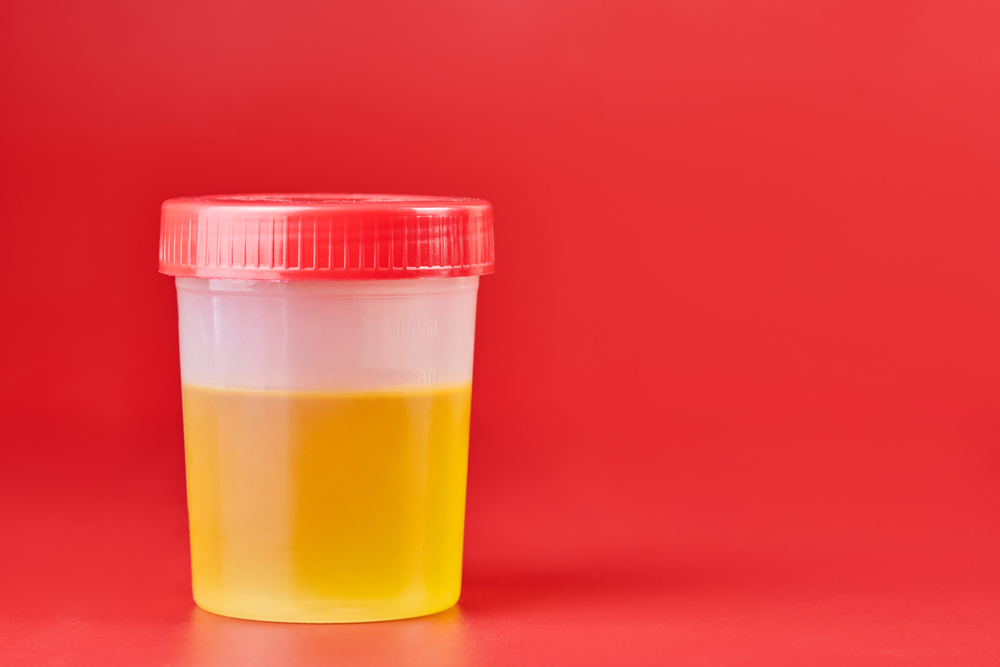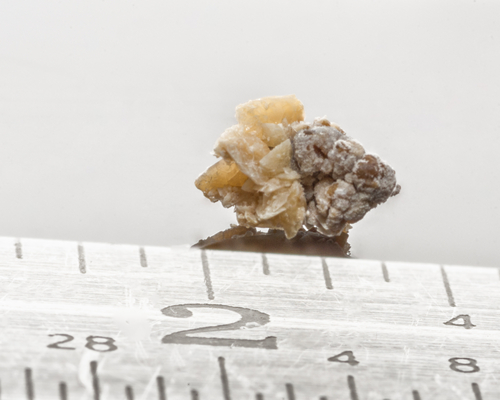What's On This Page?
ToggleThe sudden appearance of bloody urine in your toilet can be very alarming. It accounts for about 20% of all visits to the urologist. The color you see depends on the amount of blood present and the concentration of the urine. Hematuria is the term used to refer to the presence of blood in the urine. Today’s article will discuss the causes, and treatments.

The color may be pink, red, or brownish in more serious cases. Usually, the intensity is a light pink tinge. It may also appear murky or cloudy. Most cases of hematuria are called “microscopic” and that just means that a lab needs to identify the presence of blood cells because you don’t see it in the urine. So in most cases, where it’s mild, your urine will appear totally normal in color – as in yellow!
Other than seeing hematuria (if you can even see it), there are other ways to tell. When investigating hematuria, physicians typically focus on simple urine tests, such as urinalysis (UA) or urine cytology, to determine the source and cause of the blood in the urine. Additional diagnostic tests, such as imaging scans or cystoscopy, may be performed to further evaluate the urinary tract. But it usually starts with a UA, or what you might call a “pee test.”
I’ve put together a list of common causes of hematuria. While the following list includes some common causes of hematuria, it is not exhaustive, and a healthcare professional should be consulted for an accurate diagnosis:
1. Urinary Tract Infections (UTIs)
Infections of the urinary tract, such as bladder or kidney infections, can lead to hematuria. Other accompanying symptoms may include frequent urination, a burning sensation during urination, and lower abdominal pain.

2. Kidney Stones
These are hard mineral and salt deposits that form in the kidneys. When the stones pass through the urinary tract, they can cause bleeding, resulting in hematuria. The pain associated with kidney stones is often severe and localized in the back or side.
3. Bladder or Kidney Infections
Infections of the bladder (cystitis) or kidneys (pyelonephritis) can cause inflammation and irritation, leading to blood in the urine. Symptoms may include pain in the lower abdomen or back, frequent urination, and fever.
4. Trauma or Injury
Any injury or trauma to the urinary tract, such as a blow to the abdomen or lower back, can result in hematuria. In some cases, the bleeding may be visible immediately, while in others, it may take some time for blood to appear in the urine.
5. Urinary Tract Obstruction
Obstruction in the urinary tract, such as due to kidney stones, tumors, or an enlarged prostate gland, can cause hematuria. The blockage disrupts normal urine flow, leading to increased pressure and potential bleeding.

6. Medications
Certain medications, such as blood thinners (anticoagulants) like aspirin or warfarin, can increase the risk of bleeding and result in hematuria. See my image for a more complete list of medications associated with hematuria. If you are wondering what herbal supplements could contribute to hematuria, please scroll down below.
7. Inherited or Genetic Conditions
Some inherited or genetic disorders, like polycystic kidney disease or Alport syndrome, can cause hematuria due to structural abnormalities in the kidneys or urinary tract.
8. Kidney Disease
Various kidney conditions, including glomerulonephritis (inflammation of the kidney’s filtering units), kidney infections, or kidney damage, can lead to hematuria.
9. Cancer
Genitourinary cancers can cause blood in the urine. Hematuria can be a symptom of urinary tract cancers, such as bladder, kidney, or prostate cancer. In these cases, blood is consistently present. There may not be any pain or infection. The Mayo Clinic has more on this topic if you click HERE.
10. Exercise-Induced Hematuria
Strenuous exercise, such as long-distance running, can cause temporary and very mild blood in the urine due to the jarring or repetitive impact on the urinary tract.

These are just some of the common causes of hematuria. It is essential to consult with a healthcare professional for proper evaluation, diagnosis, and appropriate treatment based on individual circumstances.
When I worked in long-term care facilities, we saw a lot of patients develop hematuria. The most common cause in them was a UTI (urinary tract infection).
We also so patients on blood thinners develop hematuria a lot, however, I’d say UTIs were the more common precipitating factor. That’s because elderly individuals, especially those residing in nursing homes, often have weakened immune systems, urinary incontinence, a catheter or some other underlying medical condition that raises their risk.
Other than UTIs, other common causes of hematuria specifically in the geriatric population include bladder or kidney stones which irritate the urinary tract, and lead to trace bleeding. Sometimes men with a history of Benign Prostatic Hyperplasia (BPH) develop it. If you’re interested in more info on BPH, read my other article, 6 Powerful Strategies for Men With Enlarged Prostate.
Maybe there’s an obstruction due to an enlarged prostate or the outlet to the bladder… it could also be very rarely a sign of urinary tract cancer. While much less common, it’s important to know this is a possibility and I only tell you so that you move forward with your doctor’s requested labs, imaging and procedures.
A lot of times, physicians will say it comes with aging, but I disagree. This condition isn’t solely attributed to becoming a senior. I’d push for a complete evaluation that starts with a UA, and basic blood tests.
Herbal Supplements Tied to Hematuria
While herbal supplements are generally considered safe, there have been rare reports of certain herbal supplements being associated with blood in the urine. These occurrences are uncommon Here are a few herbal supplements that have been rarely associated with hematuria:
Saw Palmetto: Saw palmetto is commonly used for urinary symptoms associated with benign prostatic hyperplasia (BPH). Rarely, there have been reports of hematuria associated with the use of saw palmetto, although a direct causal relationship has not been established.
Gingko Biloba: Gingko biloba is often used for cognitive function and other health benefits. Rare cases of hematuria have been reported in individuals using ginkgo biloba. It’s really infrequent! If you use ginkgo, it may be fore it’s blood thinning properties, and if so, please read my other article, 12 Critical Natural Blood-thinning Foods, Herbs and Spices.
Dong Quai: Dong quai – the female ginseng – is an herb used in traditional Chinese medicine. In rare cases, dong quai has been associated with hematuria. Please use caution when using this herb, especially if you have a history of bleeding disorders. You may be interested in this article, Finding Relief, The 10 Best Ways to Treat Hot Flashes.
The occurrence of hematuria as a side effect of dietary supplements is really rare, but I would be remiss if I didn’t at least share them with you. If you are taking these or any other herbal supplements that you think are tied to hematuria, please speak to your doctor about discontinuing them.
Treatment
The treatment of this condition, which is really more of a symptom, depends on the underlying cause. That makes it critically important to see your doctor in order to uncover the root cause. With that said, here are some general approaches to treating hematuria:
Treating Underlying Conditions – If an underlying condition, such as a urinary tract infection (UTI), kidney stones, or bladder cancer, is causing the hematuria, the primary focus is on treating that condition. This may involve you having to take antibiotics for an infection, or pain pills to manage kidney stones or surgical interventions for tumors or obstructions.
Medications – Depending on the cause of hematuria, certain medications may be prescribed to address the underlying condition. For example, antibiotics for UTIs, medications to manage kidney diseases, or medications to address bladder or prostate issues.
Lifestyle Changes – In some cases, lifestyle modifications can help manage or prevent hematuria. This may include increasing fluid intake, because some (maybe most people) are dehydrated. You can make yourself more dehydrated if you drink a lot of coffee. So drink more water and add electrolytes to it. Also, avoid certain foods that can irritate the urinary tract, or make dietary changes to prevent kidney stone formation (you may want to consider a low oxalate diet).
Hematuria will require monitoring over time to assess any changes or recurrence. Luckily, the tests are pretty simple to do. Don’t ignore it, see your primary care physician, urologist, or nephrologist. Your specific treatment approach will depend on the root cause, severity, and duration of hematuria.
Summary
It’s important to note that the visual appearance of blood in the urine can be influenced by various factors, such as the amount of blood, urine concentration, and other substances present in the urine. If you notice any significant changes in the color of your urine, please see a doctor to get a proper evaluation and treatment.

Suzy Cohen, has been a licensed pharmacist for over 30 years and believes the best approach to chronic illness is a combination of natural medicine and conventional. She founded her own dietary supplement company specializing in custom-formulas, some of which have patents. With a special focus on functional medicine, thyroid health and drug nutrient depletion, Suzy is the author of several related books including Thyroid Healthy, Drug Muggers, Diabetes Without Drugs, and a nationally syndicated column.



